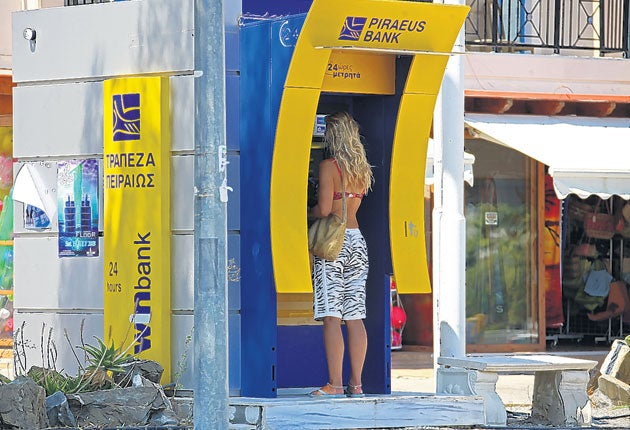Don't get stung by high fees when you're splashing out abroad
As Nationwide starts charging customers who use its cards outside Britain, Alessia Horwich looks for lower-cost alternatives

It's all change in the world of foreign spending and recession rules now apply. Charging commission for currency exchange is no longer de rigueur just on the high street; credit and debit card providers are keeping the profits on foreign exchange rolling in by slapping a foreign transaction fee on to purchases abroad.
As of 6 May, Nationwide is jumping on the bandwagon charging credit card customers who spend outside the eurozone 0.81 per cent of the transaction value in order to cover costs they incur from Visa. However, other cards charge as much as 2.99 per cent, enough to cover the Visa fee and more besides. So is there any way to reduce the cost of spending overseas?
One way to dodge the foreign fee bullet is with a travel money card. A new tool designed specifically for spending abroad, these are MasterCard or Visa prepaid cards that do not charge commission fees for spending abroad. They work like pay-as-you-go mobile phones: you load foreign currency on to the card online, by phone or by SMS using a credit card, debit card or bank transfer, and then use it to spend. Some cards are specifically for use in the eurozone and will be free to use within it, but will charge for use elsewhere. Similarly you can get cards that are solely for use in the US. One of the cheapest cards on the market is the Caxton FX Global Card which has no transaction fees, regardless of where you are in the world, and does not charge you to load the card with cash or use an ATM outside the UK.
Unfortunately, other standard deals on the market, such as the Post Office Travel Money Card, are not so straightforward. Many have baffling lists of charges, including fees for loading money on to the card, ATM charges and the cost of buying the card in the first place, which can cancel the benefit of free foreign transactions. Samantha Owens from financial information service Moneyfacts.co.uk says, "If you get a travel money card with free overseas transactions, check you're not getting charged in other ways. It's important to assess the small print to make sure you're not paying over the mark."
However, a major benefit of a travel money card is security. The loss you can suffer if your card gets stolen is finite as thieves can spend only as much as there is on the card. Cards can also be managed remotely, perfect for parents who want to control how much their travelling teenagers spend, and the exchange rates used are often competitive compared with those offered by bureaux de change. The most retro way to spend abroad is the traveller's cheque, still widely available and, if you're clever about it, fee free. Traveller's cheques are essentially a way of sidestepping ATM withdrawal fees and carrying cash with a built-in insurance policy. If they are lost or stolen you can phone in your unique reference number and the cheques will be replaced anywhere in the world within 24 hours. They are available in five currencies (euro, US dollar, Canadian collar, Australian dollar and sterling) and are commission free to purchase from certain outlets, although not all. The Post Office, for example, charges 1.5 per cent for buying sterling cheques, but any other currency offered is commission free. To cash them in without incurring charges you have to go to one of the American Express fee-free exchange partners. There are thousands in major cities worldwide and you can find the nearest one to your holiday destination online at americanexpress.com/feefree.
If you are using your cheques abroad to buy another currency (eg using your US dollars traveller's cheques to buy Guatemalan quetzals), it is always important to look out for the exchange rate. This can vary massively, especially if you are exchanging your cheques in a non-financial business such as a hotel. Patrick O'Neill, a spokesman for the Post Office, says, "It becomes something that is almost forgotten about by people, but to get the most currency for your pound you need to look out for the exchange rate even when the transaction is commission free."
If you want to carry cash, you can get cheaper foreign currency by buying online in advance, rather than getting the poor exchange rates offered last minute at UK airports. Lower overheads mean you get more for your sterling and you can get round the delivery costs by picking the money up from a high-street branch or at the airport itself. This is an option available when you order currency from Travelex.co.uk, which also offers to refund you the difference if you can get your currency cheaper elsewhere.
Despite Nationwide's decision, there are still credit cards on the market that don't charge any foreign transaction fees (except for cash withdrawals). The Post Office credit card has 0 per cent commission on purchases overseas and the Saga credit card doesn't charge on transactions within Europe. Abbey is also planning to relaunch its Zero credit card, which has free overseas purchases, at the beginning of May, and even current Nationwide customers shouldn't be completely disheartened, as spending with a Nationwide card is still significantly cheaper than with most other cards.
Join our commenting forum
Join thought-provoking conversations, follow other Independent readers and see their replies
Comments
Bookmark popover
Removed from bookmarks